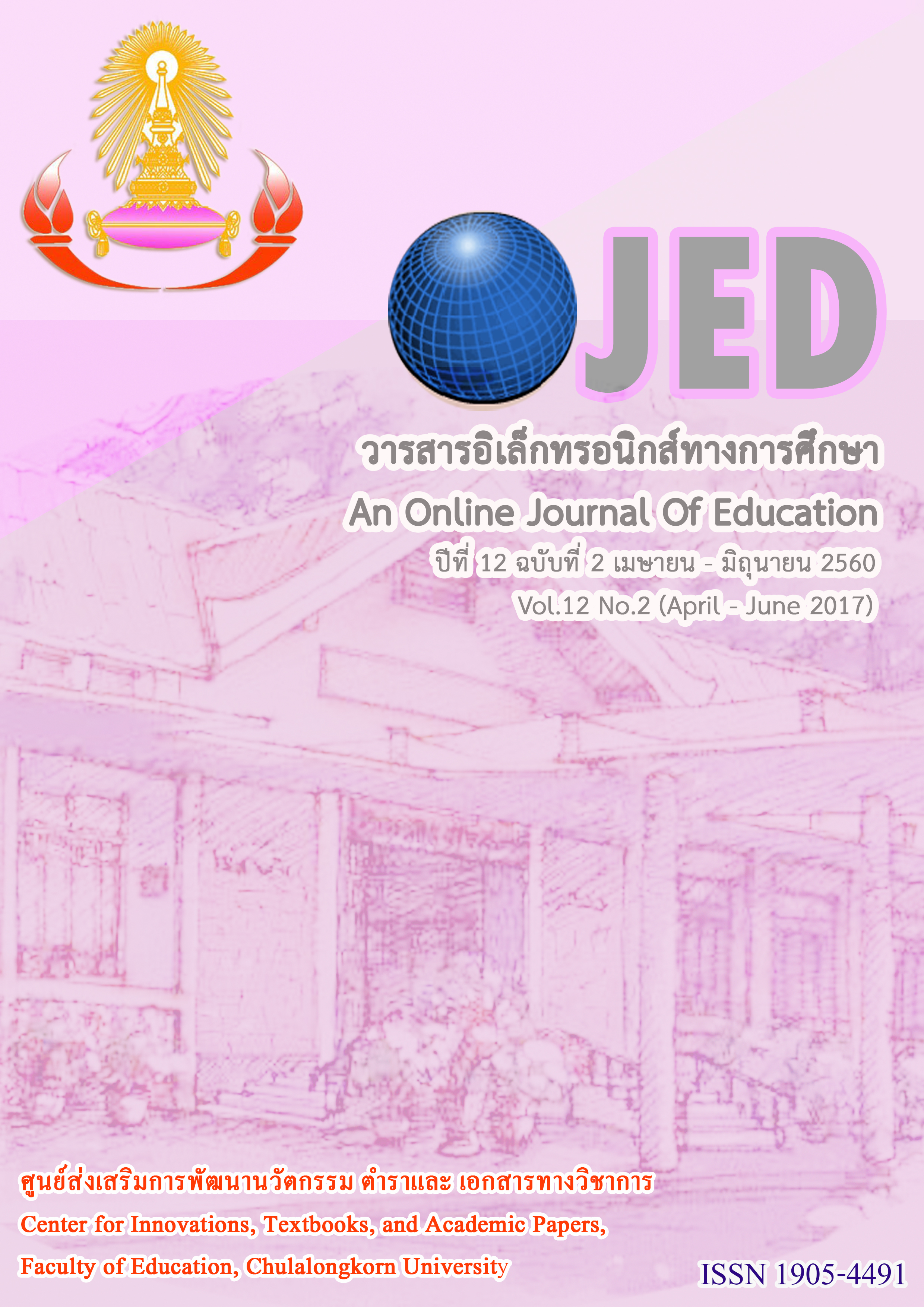การพัฒนาเจตคติ แรงจูงใจใฝ่สัมฤทธิ์และพฤติกรรมการเรียนรู้วิชาคณิตศาสตร์ ของนักเรียนชั้นมัธยมศึกษาปีที่ 3 โดยใช้การจัดการเรียนการสอนที่เน้นกิจกรรมเป็นฐาน
Keywords:
เจตคติต่อวิชาคณิตศาสตร์, แรงจูงใจใฝ่สัมฤทธิ์ในการเรียนรู้วิชาคณิตศาสตร์, พฤติกรรมการเรียนรู้ วิชาคณิตศาสตร์, การจัดการเรียนการสอนที่เน้นกิจกรรมเป็นฐาน, ATTITUDE TOWARD MATHEMATICS, ACHIEVEMENT MOTIVATION TOWARD MATHEMATICS, MATHEMATICS LEARNING BEHAVIOR, ACTIVITY-BASED INSTRUCTIONAbstract
งานวิจัยในครั้งนี้มีวัตถุประสงค์เพื่อ 1) เปรียบเทียบเจตคติ แรงจูงใจใฝ่สัมฤทธิ์และพฤติกรรมการเรียนรู้วิชาคณิตศาสตร์ ของนักเรียนระหว่างกลุ่มที่ได้รับการจัดการเรียนการสอนที่เน้นกิจกรรมเป็นฐานกับกลุ่มที่ได้รับการจัดการเรียนการสอนแบบปกติ 2) เปรียบเทียบเจตคติ แรงจูงใจใฝ่สัมฤทธิ์และพฤติกรรมการเรียนรู้วิชาคณิตศาสตร์ของนักเรียนกลุ่มที่ได้รับ การจัดการเรียนการสอนที่เน้นกิจกรรมเป็นฐานในช่วงก่อนเรียนและหลังเรียน 3) ศึกษาพฤติกรรมการเรียนรู้วิชาคณิตศาสตร์ ช่วงก่อนเข้าเรียน ระหว่างเรียนและหลังเลิกเรียนของนักเรียนกลุ่มที่ได้รับการจัดการเรียนการสอนที่เน้นกิจกรรมเป็นฐาน จำแนกตามระดับของเจตคติต่อวิชาคณิตศาสตร์และแรงจูงใจใฝ่สัมฤทธิ์ในการเรียนรู้วิชาคณิตศาสตร์ กลุ่มตัวอย่างคือ นักเรียนชั้นมัธยมศึกษาปีที่ 3 ภาคเรียนที่ 2 ปีการศึกษา 2559 จำนวน 2 กลุ่ม คือ กลุ่มทดลองและกลุ่มควบคุม กลุ่มละ 50 คน เครื่องมือที่ใช้ในการวิจัย คือ (1) แผนการจัดการเรียนการสอนที่เน้นกิจกรรมเป็นฐาน (2) แผนการจัดการเรียนการสอนแบบปกติ (3) แบบวัดเจตคติต่อวิชาคณิตศาสตร์ (4) แบบวัดแรงจูงใจใฝ่สัมฤทธิ์ในการเรียนรู้วิชาคณิตศาสตร์ (5) แบบวัดพฤติกรรมการเรียนรู้วิชาคณิตศาสตร์ (6) แบบสังเกตพฤติกรรมการเรียนรู้วิชาคณิตศาสตร์ (7) แบบสัมภาษณ์เกี่ยวกับพฤติกรรมการเรียนรู้วิชาคณิตศาสตร์
ผลการวิจัยพบว่า 1) เจตคติ แรงจูงใจใฝ่สัมฤทธิ์และพฤติกรรมการเรียนรู้วิชาคณิตศาสตร์ของนักเรียนที่ได้รับการ จัดการเรียนการสอนที่เน้นกิจกรรมเป็นฐานสูงกว่านักเรียนที่ได้รับการจัดการเรียนการสอนแบบปกติอย่างมีนัยสำคัญทางสถิติที่ระดับ .05 2) เจตคติ แรงจูงใจใฝ่สัมฤทธิ์และพฤติกรรมการเรียนรู้วิชาคณิตศาสตร์ของนักเรียนที่ได้รับการจัดการเรียนการสอนที่เน้นกิจกรรมเป็นฐานช่วงหลังเรียนสูงกว่าช่วงก่อนเรียนอย่างมีนัยสำคัญทางสถิติที่ระดับ .05 3) พฤติกรรมการเรียนรู้วิชาคณิตศาสตร์ในช่วงก่อนเข้าเรียน ระหว่างเรียนและหลังเลิกเรียนของนักเรียนกลุ่มที่ได้รับการจัดการเรียนการสอนที่เน้นกิจกรรมเป็นฐานที่จำแนกตามระดับของเจตคติต่อวิชาคณิตศาสตร์และแรงจูงใจใฝ่สัมฤทธิ์ในการเรียนรู้วิชาคณิตศาสตร์มีพัฒนาการที่ดีขึ้น
The purposes of this research were to: 1) compare the attitude, achievement, motivation, and mathematics learning behavior toward mathematics between two groups of students in which one group received activity-based instruction and another received regular instruction; 2) compare the attitude, achievement, motivation and mathematics learning behavior of the group of students who received activity-based instruction between, before and after receiving the activity-based instruction; and 3) study the mathematics learning behaviors of the students in three phases: before coming to class, during class, and after dismissal from class, and classify these according to the levels of attitude toward mathematics and achievement motivation in learning mathematics of the students who underwent the activity-based learning method. The samples were two groups of ninth grade students: an experimental group and a control group of 50 students each. The research instruments were (1) activity-based instructional plans, (2) general instructional plans, (3) the attitude toward mathematics tests, (4) the achievement motivation toward mathematics tests, (5) the mathematics learning behavior tests, (6) the mathematics learning behavior observation forms, and (7) the mathematics learning behavior interview forms.
The research findings were as follows: 1) the attitude, achievement, motivation, and mathematics learning behavior toward mathematics of the group of students who received the activity-based instruction was higher than those who received the regular instruction with statistical significance at the .05 level; 2) the attitude and achievement motivation toward mathematics of the group of students who received the activity-based instruction were higher after receiving the activity-based instruction than before receiving the activity-based instruction with a statistical significance at the .05 level; and 3) the development of mathematics learning behaviors of the students in three phases: before coming to class, during class, and after dismissal of class, classified according to the levels of attitude toward mathematics and achievement motivation in learning mathematics, those who were received the activity-based learning method developed in a positive direction.




